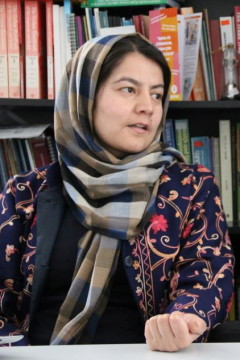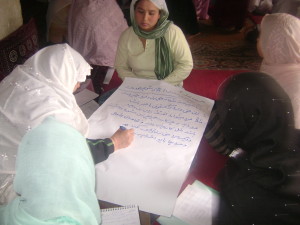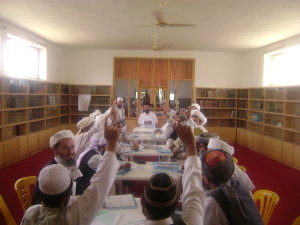
By Zuhra Abhar
Ms. Arezo Qanih, Program Manager of the Educational Training Centre for Poor Women and Girls of Afghanistan (www.ecw-af.org) has been engaged in the protection of women’s rights since the early age of 12 years old.
Ms. Arezo remembers that as a little girl who joined ECW alongside her mother, Ms. Malika Qanih (ECW’s Founder and Director), she was shocked by the lack of opportunities for women in Afghanistan and their lack of financial independence.
Ms. Arezo says:
“Women were trapped between four walls. They had nothing to do all day and did not know how to support themselves financially. The center was meant to be a junction for women to learn from each other.” In its first year, ECW assisted 500 women who attended sessions and shared their experiences and ideas.
Ms. Arezo began to work at the centre as a computer programmer. Throughout the Taliban period in Afghanistan, she continued to attend the center and dedicate herself to helping other women. Her responsibilities increased and in 2005, after graduating from Kabul University, she became ECW’s Program Manager.
Ms. Arezo’s long-standing experience working on social issues in Afghan society led her to believe that it is essential for a women-oriented NGO to work with the entire community: “It is only by allowing all members of society to become active members of Afghan civil society that women’s conditions will improve.”
Based on this belief, ECW programs provide training on income generation and rights to Afghan men and women across Afghanistan.
After many years of patient work, ECW has managed to create a presence in Kabul, Kunduz, Baghlan, Takhar, Badakhshan, Parwan, Panjsher, Kapisa, Ghazni, Nangarhar and Faryab provinces. ECW now operates programs across these provinces serving over 15,000 people in 2012. Since 2002, more than 20 organizations, 500 religious leaders, and 14,500 community members, women and children directly benefited from ECW’s programs.
Ms. Arezo reflects: “We used to be present only in Kabul – and could not even access all the districts. We now cover much more territory.”
ECW’s biggest victory, according to Ms. Arezo, is its program on education and skills training, peacekeeping, and access to Islamic justice, education, civic education and economical empowerment of women. This link with religious leaders is of utmost importance at a moment in which violations against women and security are increasing.
Religious leaders are the ones who can influence the population’s mentality and improve the situation, in Ms. Arezo’s view. As it becomes more and more difficult and dangerous for women to get an education and work, Ms. Arezo is convinced of the importance of having more women leaders in key positions throughout the country. In order to promote this, she has joined the Young Leaders Forum, and as a member she travels to various countries to meet other young leaders.
One of ECW’s beneficiaries, Masooda, is a young Afghan woman who returned to Afghanistan after a long exile in Pakistan. When she came to Afghanistan, there was no opportunity to work to support her family until she was hired as a marketing officer at ECW. After some time, ECW decided to have a showroom in Kabul, for which Masooda was given responsibility.
Then ECW supported Masooda to have her own shop. Masooda became self-sufficient and now she has two shops in the Women’s Park in Kabul. She has participated in many international conferences outside of Afghanistan through ECW. ECW sees this as one of its activities to support women’s empowerment in Afghanistan.



No Comments